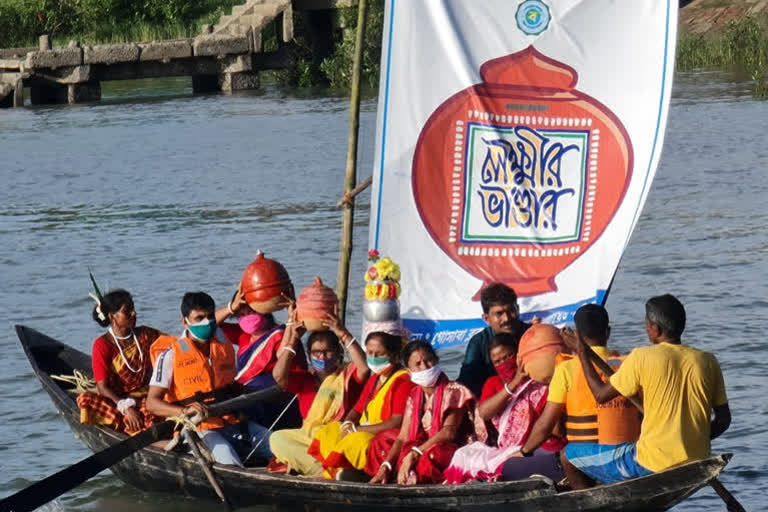Kolkata: West Bengal government has received over two crore applications for the Lakshmi Bhandar scheme, a monthly scheme of Rs 500 to Rs 1000 as financial assistance for women in Bengal. The scheme was announced by Mamata Banerjee. But can such a scheme, which is dole in the true sense, really ensure women empowerment? What do opposition parties, economists, social scientists and professionally successful women have to say? ETV Bharat tried to find some answer.
According to the former leader of Left Parties in the West Bengal assembly and the CPI(M) central committee member, Dr Sujan Chakraborty, his party has never objected to any development or welfare scheme of any government. "But the manner in which such projects are being used as a tool of Mamata Banerjee's appeasement politics, we object to the fact that the state government has curtailed budgetary allocation for important infrastructure projects like roads and bridges, in order to divert funds for projects like Lakshmi Bhandar. The bankruptcy condition of the state exchequer has become evident now," he said.
BJP's state vice president, Jaiprakash Majumdar said dole is always more important for Mamata Banerjee than real development. "She is spending a huge amount of money to provide pocket money to common people. Had this amount been utilized behind infrastructure projects, there would have been scope for employment generation in the state," he said.
Also read: Mamata Banerjee's development projects draw attention in other states
Congress leader, Amitava Majumdar said that they are not against monetary assistance for socially and financially backward people. "But the manner in which the state government is curtailing budgetary allocation for infrastructure projects to fund these welfare projects, cannot be accepted at any cost. Congress, as a party, has always backed the state government's welfare projects. But our question is how far such dole politics will ensure women empowerment in the true sense," he added.
However, the leaders of the ruling Trinamool Congress do not agree with such contentions. According to senior Trinamool Congress legislator and the party spokesman, Tapas Roy, people always say the last word in democracy.
"The immense popularity of the Lakkhir Bhandar project among the common and lower-income group women is proof of its success. The women of Bengal has proved that the chief minister took the right decision by launching this project. Those who are opposing or criticizing the project are actually trying to overlook the public opinion," he added.
Speaking on this issue, renowned political scientist and former registrar of Calcutta University, Raja Gopal Dhar Chakraborty said dole politics can never achieve real development. "But for the last few decades, almost all the political parties have treaded through this path. So why blame the Trinamool Congress alone? Every political party should introspect on this issue. Only then will real change come. The political party which is criticizing welfare projects now have resorted to the same politics some time or the other," he added.
Also read: West Bengal: Former CM Buddhadeb Bhattacharjee's sister-in-law frets over unresolved pension issue
Speaking on this issue, teacher of economics, Probir Kumar Mukhopadhyay said that the socio-economic condition of West Bengal, rather than India, is such that dole projects are bound to become popular. "So it is natural that the lines will last longer in Lakkhir Bhandar camps. This is nothing new. It is also true that it is the duty of the government to start and run some welfare projects. But when the basis of politics is only dole-politics then the state's economy is bound to take a hit. Neither the state's economy nor industrialization can fructify in a dole politics-oriented politics. That is what is happening in West Bengal now. Now industrialization and no employment generation," he said.
Senior academic administrator, Suchismita Bagchi Sen finds the problem in the continuation of welfare projects like Lakkhir Bhandar. "At least some money is coming to the women coming from financially backward sections. But at the same time, the state government should ensure that these women have enough avenues for income generation. The state government should also ensure proper marketing of the products produced by them," she said.



